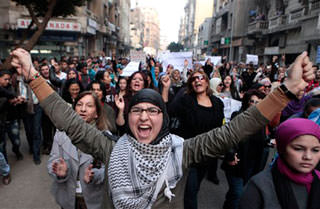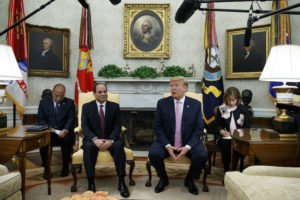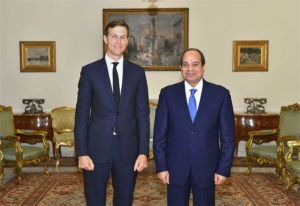Dispatches From Cairo: Raising Cane Against the ‘Morality Police’
Some Egyptian women have an answer for vigilantes armed with walking sticks: welts and words that are far from submissive.
We asked Lauren Unger-Geoffroy, an international artist who lives in Cairo, to share her perspective of life in Egypt after the revolution. In this entry, she writes about the emergence of vigilante “vice patrols” that seek to impose a dress code on women.
CAIRO — “Cover yourself, sisters!”
This gave Eman and me a bit of a shock, as we were “covered,” wearing hijab, our hair covered by draped scarves, coordinated with our culturally conforming outfits — jackets, with jeans and hip-length tunic in one case and a long skirt in the other. We were walking back from a fast-food restaurant in a Cairo suburb where Eman is living with her husband while they finish their studies in political science and business management. I had been reflecting on the masculine words for “humanity” in various languages: man, l’homme, mankind, the Egyptian expression “sons of Adam.”
The bearded, 30-ish man in the dark galabeya looked at us severely, while keeping his gaze slightly away, and repeated his admonition: “Your clothing is immodest. Go home and correct yourselves.”
We froze for a moment and I was speechless, but Eman, a vocal young revolutionary, and never one to be cowed by a man, turned and said defiantly: “Who are you? Who gave you the right to represent Islam or to judge me? You don’t know me. I am perfectly covered and I do not need to justify myself to you!”
Hardly believing her audacity, he scolded her. “Your face should be covered outside. And you should not be speaking to a man like this!”
This was too much, and Eman exploded. “And you can talk to me? This is not Sunna! That is not Muhammad PBUH’s words! This is not the wish of Allah that women do not have the right to speak! Muhammad PBUH listened to his women. Who assigned you the authority? I am a true Muslim, I fought for the rights of my people, I prayed with my brothers and sisters while tear gas was shot at us. I am trying to create a country where people can eat and have what they need to live and worship — and what are you doing? You are patrolling to tell me I am not covered enough? You think that is the most important thing? That is all that Islam is — that women must all wear a niqab? This is the most important thing for you?”
She was on a roll and people were gathering.
The man was turning red with rage and humiliation. He did not have a cane to strike us but looked as if he wished he did. I put my hand on Eman’s shoulder to signal my support but also to try to calm her. There were about 10 people gathered now, including about four women, one of whom said, “She is right.” Most of the other women mumbled in agreement. One of the older ones said to us, “Bishwish, calmly, slowly, don’t get so nervous.” Two of the others, big women, put their hands on their hips and looked daggers at the man, and one, an old woman, said to him, “Just go now, brother. No problems.”
The man turned to the others and noticed the other men had black sajdah marks on their foreheads equal to his, and they were not with him. “You shall see. You shall see,” he growled and turned and walked away angrily.
Those gathered round us started talking about the incident, agreeing that Egypt’s people had not taken their courage into their hands and sacrificed everything in order to submit to Wahhabist oppression. The women were all dressed in Islamic fashion with long jilbabs and abayas. A few women wearing niqab passed us. After a while Eman and I left amid the clasping of hands and shoulder pats and smiles and “Don’t worry,” “Take care” and “Peace.”
The man who accosted us may have been part of a new group I had heard about a few days before. According to the Tahrir News, in Benha, a small town in the Nile delta, over the New Year weekend a group of ultraconservative, bearded young men had gone around wielding canes and calling themselves the Committee for the Promotion of Virtue and Prevention of Vice. Self-styled morality police, like those in Saudi Arabia, they threatened shop owners who sold Western or “immodest” clothing and intimidated female customers, accusing them of “indecent behavior.”
Barbers were told they could no longer shave men’s beards, and retail businesses were told there would be inspections to check for compliance. Women were ordered to cover up and obey “God’s law on earth.” Committee members closed down some shops and destroyed some clothes, and told women who were not in niqab that they would be physically punished if they did not cover completely.
Apparently some of the patrollers met with an unexpected reaction when they entered a Benha beauty salon.
When they burst into this sanctuary of women’s vanity empowerment, ordering the women out, calling their hairstyling and manicures and beauty treatments “indecent” and a “forbidden vice” and threatening to strike them with the canes if they did not stop what they were doing, the women fought back. They grabbed the canes and whipped the intruders with their own weapons and pushed them out to the street as an impressed crowd gathered and cheered.
Many Egyptians love that story. Everyone here knows people like both those self-righteous men and those tough women.Yes, Egyptian women have proved to be the force behind much of the revolution. They have shown the world their true strength of character, so different from the West’s imagined submissive, silent, oppressed Arab female. Perhaps it is the women who will be the greatest protectors of the revolution’s hard-defended values.
In the roiling chaos of extreme disparate and imprecise visions and goals for Egypt’s future, the unpredictable nature of this transformation is the only sure thing.
Despite the cultural anomaly of men and women mixing freely in the square in close proximity, late at night, conversing, even touching — women unchaperoned by men — the people have not lost their attachment to Quranic Shariah law. Although a few women have reverted to their pre-2007, non-hijab, loose-haired style, the silent majority have tightened their hijabs, and more and more women cover up with the niqab. Of course the great majority of women, like women everywhere, exercise their feminine vanity, wearing adornments and makeup, caring about their attractiveness somehow, fixing their hair, dressing to please, either outwardly or underneath, and refusing to feel that everything that is pleasureful is evil.
The Facebook page of the so-called Committee for the Promotion of Virtue and Prevention of Vice says it will monitor the behavior of citizens to prevent anything not in compliance with Islamic doctrine and will enforce prayers at appointed times and the closing of shops when calls to prayer are heard. Gender segregation in public transportation and universities is also one of its goals, according to media reports.
In a recent statement, the committee declared that it would begin operating more broadly by the beginning of next month, with the enforcers wearing white cloaks and carrying recently imported electric batons to defend themselves if attacked while “fulfilling their duties.” However, the Facebook page says the group will “not resort to violence, but will depend on debate and preaching to implement Islamic Law.”
The group first appeared on Facebook last month, where its official page was soon hacked before another one was launched to take its place.
According to the page, any “religiously committed” Muslim man between 25 and 40 with a high school diploma is invited to apply to join the group. Those accepted are promised a weekly salary of 500 Egyptian pounds and one meal per day, which is more than what 87 percent of Egyptians get now. Poor teenagers whom I know used to go to Tahrir Square for the free food and drinks that people were donating. Hungry allegiance is easy to obtain.
On the Internet, the committee once claimed it not only had the backing of members of Salafist Al-Nour’s leadership council, but that the Nour leadership had in fact provided its funding. Its Facebook page now says, “We are not directly affiliated with the Nour Party, but we are members of it, and we adopt the same frame of reference.”
The Nour Party, however, denies having any connection whatsoever with the group. Party officials have tried to control the actions of individual Salafi sheiks, like the mediatic Abdel Moneim el Shahat in conservative Alexandria, who has suggested covering the “obscene” figures on Egypt’s ancient monuments with wax.
Islamist parties have democratically been elected to an overwhelming majority of parliamentary seats in Egypt’s first post-Mubarak elections, and proved what we have known, that the silent majority in Egypt consists of fundamentalist Muslims who are comfortable with Shariah law. However, even Salafist fundamentalists are uneasy with the emergence of the self-appointed “morality police.”
Sunni sheiks and Egyptian former mufti Nasr Farid, who was once responsible for issuing religious edicts, or fatwas, based on Shariah law, agree, stating that these men were “usurping state authority and did not have the jurisdiction to impose their concept of religious law.”
Sheik Mohammed El Mahdi an imam at Cairo’s great Al-Azhar Mosque, declared that this fringe group had no legitimate or legal authority. In his Friday sermon Jan. 6 he made a special statement about the subject, stressing that “each individual is responsible for removing all that is evil within himself, and for his own virtues and merits in the eyes of Allah; every man must choose to be good, and we are not in need of such committees.”
Ignoring the rejection from Al-Azhar, the highest religious Sunni authority in the world, the committee said that the fact that millions of Egyptians voted for the Nour Party, giving it nearly 30 percent of parliament seats, justified the formation of a “morality police” to enforce Shariah law.
After an emergency meeting, Al-Azhar released a statement saying that for a thousand years it has been the only lawful authority on the Islamic religion in Egypt.
Al-Azhar Mosque and university has held a centrist position since its inception in the year 973 and is considered by most Sunni Muslims to be the greatest authority and most prestigious school of Islamic law. Its scholars are seen as the highest in the Muslim world, teaching Quranic sciences and traditions as well as all the modern fields of applied science. The last few centuries have notably opened the door to scholarly debate on interpretation of definitive texts in light of what the mosque sees as appropriate and in accordance with the requirements of the age. After Friday prayers ended, the sheiks, who had all continued in the same vein as Mohammed El Mahdi, were surrounded by worshipers amid a heavy security presence outside the mosque.In speaking to Al Ahram paper, Islamist lawyer Montasser El-Zayat said, “The idea of having such a committee is legitimate and in accordance with the Quran — but should not force anyone to do — or not do — anything.” He added, “It should convince people of its beliefs in a respectful, peaceful way.”
Zayat also said, “And, of course, it would be better if such a committee was run by the government and not by an independent group.”
In fact, Zayat, like many Egyptians, accustomed to constant manipulation, believes the committee to have been created to discredit Islam and Islamists. “This group in Egypt seems to be a hoax made up by someone who wants to defame the Islamists after their landslide victory in parliament.”
Meanwhile, this is one more matter that distracts the people’s attention from any productive strategy for dealing with the real issues of Egypt: poverty, health care, infrastructure, education.
While the various factions focus on the perils of Shariah enforcers, sectarian immorality, dignity, freedom, democracy, equality and other dramatic and abstract needs, the economy remains a disaster and the people remain unaware of the scale of the problem. Unemployment is at its highest rate in 10 years. Forty percent of Egyptians are living on less than $2 a day. ”Ash, horreya, adela” (“Bread, freedom, social justice”) — that was the revolutionary cry.
One-third of Egypt’s budget is spent on subsidies, mainly food like bread and sugar, and no plan to deal with the economic chaos has been put in place by either the Supreme Council of the Armed Forces or the political parties, including the Islamists and the liberals. Foreign investments are fleeing the country. Though there has been discussion with the International Monetary Fund about a $3 billion loan, the SCAF prefers to have Egypt go it alone.
We are still under “emergency law,” there are still thousands of dissidents in prison, and there are recurring peaks of dramatic violence between period of unfocused calm.
Billions of dollars and other huge assets are unaccounted for, apparently forgotten in the short memory of the revolutionaries who overthrew a corrupt government that bled the country dry while the people went hungry. Bread has lost its place in the list of demands, behind revenge and partisanship and tragedy and glory. The new anti-vice committee seems incredibly convenient as another divisive shard in the election/parliament/constitution/president grab bag.
People will be woozy and weak and worried, their minds batted about by opposing teams — who are our friends and who are our enemies? And who will protect us? — as we go fear-tumbling once again from lack of truth and knowledge and self-determination.
Nobel Peace Prize winner Mohamed ElBaradei stated he would not be running for president, adding that this decision does not mean his complete withdrawal from the political scene; he says he will continue serving society “outside any positions of power, freed from all the chains.” He further added that “my conscience will not allow me to nominate myself to the presidency or any formal position without the presence of a real democratic framework that uses the essence of democracy, not just its image.”
Who will ask if the military will really allow civilians to pick the full Cabinet, including the ministers of defense, interior and finance? Will the generals accept an end to the riches and enormous “special privileges” they have possessed for the last 60 years? Will the generals demand immunity from prosecution?
The military has cleverly appropriated the first anniversary of the start of the revolution, Jan. 25, and has orchestrated a vast and extended celebration. It will hold festivities in Tahrir Square — a three-day extravaganza of concerts, air shows and a football match for the benefit of the injured. Egypt National Day has been changed to Jan. 25 from July 23. There will be events over the whole 18 days of the key revolutionary period, with honors going to the martyrs and the heroes. In view of this hoopla, who can call the SCAF counterrevolutionary? In fact, anyone who would interfere with this celebration would be seen as counterrevolutionary.
Meanwhile, the people scrape and live and gobble some propaganda, unable to concentrate on the fine print while waiting for the next roller-coaster plunge.
It’s a wild ride, but if anyone thinks that the women of Egypt will run fluttering and terrified into silent and invisible submissiveness, they have understood nothing. If the few “vice patrol’ incidents that have been reported in the Qalioubiya governorate north of Cairo and 6 October City, on the outskirts of the capital, are an indication of a real trend, I think we will see the biggest revolution yet. Remember the women demonstrating in outrage at their treatment by the police? That was only a hint of the bravery of the Egyptian woman, no weak sister. … I wish I could have seen the beauty salon turn on the committee members who wanted to deprive its occupants of their dignity. But I did see my friend Eman yell at one who tried to diminish hers.
“It’s the same guys who burned the churches and the shrines of the Sufis. They are Salafi thugs,” she said to me with that familiar, confidant Egyptian ardor and imprecision. “Nothing more than that. But I swear to Allah, if they try to mess with us, we will kick their ass.”
Images of guns and clubs and death cars and tasers and that other tough-talking girl — the one whose blue bra was exposed as she was being stomped and bludgeoned by soldiers — came to my mind, and I chased those thoughts away. “Ya, revolution queen. You go, girl.”
Your support matters…Independent journalism is under threat and overshadowed by heavily funded mainstream media.
You can help level the playing field. Become a member.
Your tax-deductible contribution keeps us digging beneath the headlines to give you thought-provoking, investigative reporting and analysis that unearths what's really happening- without compromise.
Give today to support our courageous, independent journalists.



You need to be a supporter to comment.
There are currently no responses to this article.
Be the first to respond.